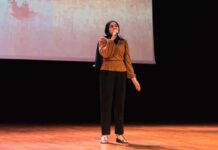By Malika Kaloo
“If you are needy and running out of money, you can eat food FeesabililAllah from our restaurant. We will not hurt your self respect,” says a poster on the glass door of Qasr Al Noor, a Pakistani restaurant in Sharjah in the United Arab Emirates.
In times of economic crisis around the world, Nadeem Abbas, the owner of the restaurant has launched an initiative to support people who cannot afford to pay for their daily meals.
In the UAE, migrant workers from African and South Asian countries have been struggling to make ends meet, especially after the pandemic.
“I used to see some customers order only tea and bread even at lunch and dinner. After analyzing the situation, I realized that they didn’t have money to buy proper food,” says Abbas.
He adds that most of these people were low-wage employees and expatriate laborers.
For Abbas, serving the community has always been his priority rather than just making a profit.
“I do this for the sake of Allah because it is a part of my deen (religion). If you are in need, you can order as much food as you want at my restaurant and I will make sure that you are treated with respect and dignity,” he says.
In Islam, the reward for feeding the poor is immense. In fact, it is one of the greatest acts of charity. As such, it is not uncommon for the Muslim world to organize food drives for charities throughout the year. It is especially significant during the holy month of Ramadan when people come together to serve the community through iftars.
“You don’t even realize the potential of generosity and kindness. Your help can change someone’s life completely,” says Ahmad Ali, an Emirati businessowner.
“Sharing iftar strengthens the relations between people,” says Amel Alshamsi, a UAE national.
She adds that sharing food with the poor and needy reinforces the Islamic values of mercy and kindness.
There are many charity organizations in the UAE that organize free iftars in mosques during Ramadan.
This comes in line with the “One Billion Meals” endowment campaign that aims to launch a food endowment fund at a value of one billion dirhams to help dozens of countries struggling with food insecurities during Ramadan. People can donate to the campaign through an online transaction, SMS, call or bank transfer.
Ahmad Ali, a 60-year-old Emirati businessowner, believes that Ramadan is the month of reflection and spirituality in which reward for charities is multiplied.
“It is our Emirati culture to keep food and water outside our homes during Ramadan so that anyone who needs it can take it without having to ask for it,” says Ali.
For Ali, setting up tents outside his home so that commuters and workers can have iftar peacefully is a beautiful way to celebrate the spirit of Ramadan.
“My family is doing this for years. I truly believe that everyone deserves to enjoy the blessings of this month without having to worry about anything,” he says.
In the UAE, many businessowners, irrespective of their nationalities, consider charity an essential element of their business.
From free food for blood donors to free food for delivery riders, these businesses have been showing generosity and contributing positively to society.
In Mujarrah in Sharjah, there is another Pakistani restaurant that invites people for free Iftar.
Al Nawab restaurant has put up a signboard that says, “Iftar is on us if you are in need.”
The restaurant prepares meal boxes that include biryani, dates, fruits, salads and water bottles for anyone who cannot afford to pay for food.
“Every day we make iftar boxes for around 500-700 people,” says Jahanzeb Yaseen, the owner of Al Nawab. He adds that these boxes have the same food that they serve to their regular customers, made with high-quality ingredients.
Yaseen has been running daily free food drives called “Dastarkhwan” in Pakistan for many years.
“When you spend one dirham for the right cause, Allah blesses you with 700 times more,” says Jahanzeb Yaseen, the owner of Al Nawab restaurant.
He says that his main aim is to spend money in the way of Allah and serve humanity.
The act of sharing food is not just about providing the underprivileged with nutrition to survive, it is about serving them with respect, dignity and compassion.
“While anyone can give charity, not everyone is capable of doing so without hurting the self-respect of the person receiving it,” says Ali.
At Qasr Al Noor, Abbas says, people can order anything from the menu and unlike other restaurants, they do not get a bill unless they ask for it.
“In this way, we ensure that they don’t feel humiliated. If they have money, they pay and if they don’t have money, they can leave after finishing their meal,” he says.
Kindness is a universal language that transcends all boundaries. It is what brings people together as a community. Whether you donate money or share food, a simple act of generosity has the power to change lives.
“There are people who cannot afford to pay even for a bottle of water. We want to help them through this initiative,” says Abbas.


















